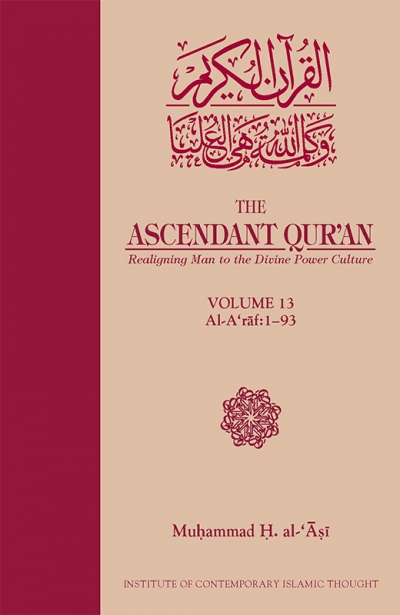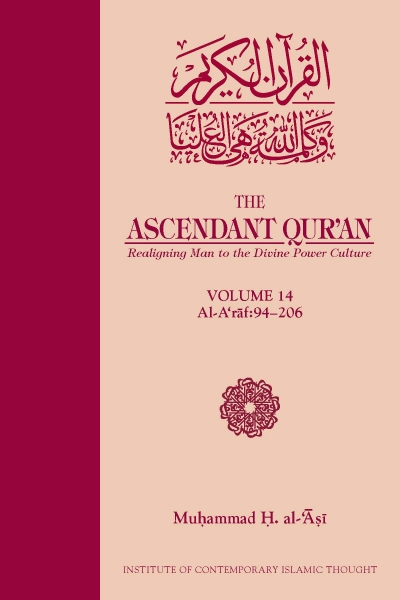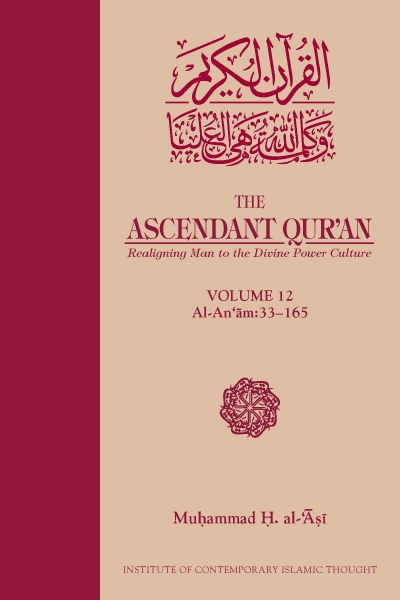The Ascendant Qur'an - Volume 13

Author(s): Muhammad H. al-'Asi
Publisher: The Institute of Contemporary Islamic Thought (ICIT)
Published on: Sha'ban, 1439 2018-05
ISBN: 9781927683095
No. of Pages: 440
Price: $10 USD
From its contents we can discern that Surah al-A‘raf, like the surah preceding it, was revealed in Makkah. The time period of revelation also appears to be the same: near the end of the Prophet’s mission in Makkah and in preparation for the Hijrah to Madinah. This is apparent from the reference to the Children of Israel and their argumentative behavior vis-à-vis Musa (AS). The Prophet (SAL) and the Muslims with him were about to encounter Banu Isra‘il, for the first time as an organized opposition, upon their arrival in Madinah.
Throughout the noble Qur’an, Allah’s Oneness (tawhid), power, and authority are constantly emphasized. He is the Creator and He is the lawgiver and only He knows what is best for His creation. This applies both to individual personal conduct as well as collective or communal existence. That is why the Qur’an explains rules for personal hygiene as well as for social interaction leading to institutional development in society, such as the adjudication of justice, the prosecution of war and managing its aftermath, the systemic distribution of wealth, and the deliberative mechanism to reach decisions on behalf of the Ummah. Man can elect not to follow divine guidance — that is a choice Allah (SWT) has given to man and jinn — but, as in all things that are understood through experience and reflection thereafter, there are consequences for making the wrong choices or for settling for less than the best choice. The cooperative and corresponding (social) domain is where man can expect to most advantageously leverage Allah’s will to manage his affair on earth. Societies that habitually and recklessly violate Allah’s commands are setting themselves up for His corrective justice both in this dunya and more particularly in the akhirah. Societies that claim to be Islamic but do not adhere to Allah’s prescriptive standards are not immune to the damaging aftereffects of secular laws that are not only un-Islamic, but often anti-Islamic. And this is especially evident today in the majority Muslim world.
Given this grim reality, it is imperative that the message of the Qur’an be understood properly to determine where we, the committed Muslims, stand vis-à-vis Allah’s command and counsel. That is what this tafsir, The Ascendant Qur’an: Realigning Man to the Divine Power Culture by Imam Muhammad al-‘Asi does. It helps us apply the Qur’anic injunctions and evaluate our proximity to them. Based on these guidelines, let us briefly consider the major themes highlighted in Surah al-A‘raf, the seventh surah in the noble Qur’an.
An important issue in the beginning of the surah is that Adam (AS) is the father of all people. When he was created, Allah (SWT) ordered the angels to prostrate themselves to him. By prostrating, the angels were not deifying Adam, rather they were demonstrating reverence to Allah’s designated khalifah (deputy, vicegerent) on earth. The angels complied but Iblis refused. When asked why he disobeyed Allah’s command, Iblis said, “I am better than he: You have created me out of fire, whereas him You have created out of clay” (7:12). By refusing to obey Allah’s command and then arrogantly rationalizing it with an excuse, Iblis became the first racist and Islamophobe. Racism has continued to plague humanity ever since, with devastating consequences. Allah wanted to expose Iblis’ racism and warn man right at the time of creation that Iblis (later to become Satan after he was expelled from Paradise) is his avowed enemy.
With his arrogance, narcissism, and racism exposed, Iblis sought Allah’s permission to lay in ambush for man, so as to try to “prove” to Allah that man was not worthy of His favor. Allah (SWT) granted Iblis that reprieve until the Day of Judgement. He then placed Adam and his wife Hawwa’ (AS) in Paradise, warning the two that they had access to anything and everything therein other than the one tree whose fruit was forbidden to them.
Iblis enticed the inexperienced couple with the supposed merits of that tree, saying that a taste of its fruit would impart angelic status upon them or even immortality. It is pertinent to note that evil always disguises itself in a pleasing garb; it does not openly admit to its deceiving nature. Thus today, nudity and sexual anarchy, for instance, are presented as “freedoms of expression.” Other evils are similarly normalized through beguiling socialization.
Once ensnared in the satanic trap, Adam and Eve (AS) began to experience shame for the first time, immediately becoming aware of their nakedness, and hence they tried to cover themselves with leaves. When Allah (SWT) reminded them of His warning, unlike Iblis they did not try to justify their disobedience. Instead, by acknowledging their mistake and seeking Allah’s forgiveness (7:23), they substantiated His wisdom in choosing the humble and God-conscious to rule on earth. The contrast with Iblis’ attitude is clear. Therefore, the satanic humans, who reject Allah’s grace, exhibit as imperialists and Zionists, whereas the muttaqi humans, who accede to divine guidance, present as muslims (in the generic sense).
After eating from the forbidden tree, Adam and Eve (AS) were sent down to earth for an exceedingly short term (compared to eternity) before ultimately being called back to their supreme Creator. Life on earth would be the proving ground where human resolve, determination, ability, and commitment to Allah’s commands would be tested against Satan’s ambition, efforts, and subterfuge to confuse and alienate man from his Lord. Unlike biblical narrations, the Qur’an rejects the notion that it was Eve who was first tempted by Iblis and then seduced Adam to eat of the forbidden fruit. Islam neither denigrates woman to lower-class status in this manner, nor expands that to all of humanity with the guilt complex of the “original sin.” Both notions have caused women to endure untold suffering and abuse during the long course of human history.
Resurrection and accountability on the Day of Judgment are again emphasized in this surah. This is the point that the deniers of Allah’s power and authority reject outright, for it means that all human actions and decisions, even those of the rich and powerful, must by necessity be subjected to a moral standard; that is, the truth is the arbiter of what people do, not powerful people developing some “truth” that aggrandizes them while marginalizing others. People who acquire temporal wealth, power, and authority try to socialize the masses with the mindset that the former are “successful” because of their own abilities and intelligence; that such acquisition has nothing to do with any higher authority. Hence, being raised from the dead to stand to account is a myth created by the powerless who are jealous of the elite; and that the end-all and be-all of life in general is to “get all the gusto you can while the going is good” in the dog-eat-dog here and now, even if that means you have to kill a million people, trample upon their livelihoods, confiscate their resources, and dispossess them of their homes and families along the way.
The point about resurrection in this surah is reinforced with knowledge about what will transpire on the Day of Accountability, “…as He prompted you [to life] so will you return [to life]” (7:29). Allah (SWT) reveals that the Final Day will separate people into three categories based on their conduct on earth: (i) those who committed themselves to Him and hence will be saved and secured in Paradise; (ii) those who objected to and denied Him and thus will perish in the Fire; and (iii) those whose deeds tip the balance neither to the first nor the second, that is, the folks of al-A‘raf (the height at which people were placed to witness both the dwellers of Paradise and Hell, and from which the surah takes its name).
The stories of earlier prophets — Nuh, Hud, Salih, Lut, Shu‘ayb, and Musa (AS) — and their peoples are narrated as warnings to the elites of Makkah, the Quraysh, in an effort to implore them to take heed not to suffer the same grievous consequences that consumed those social orders. These narratives are intended to remind man about the serious repercussions his societies will face when they persecute their prophets.
This surah alerts the committed Muslim to a new subject — homosexuality — that is largely justified as normal behavior in many societies of the world today. The people of Lot (AS) indulged in this abominable practice despite divine warnings to the contrary. They not only ignored their prophet’s exhortations, they turned against him and his small group of followers. Islam’s position is abundantly clear: sexual relations are permitted only between men and women who are legally and morally tied to each other through a bond of marriage (nikah) in which gender rights are contingent upon their responsibilities to one another, to the family, and then to the society at large. Promiscuous and deviant sexual behavior — homosexuality, incest, adultery — are condemned in the strongest possible terms with stern warnings from Allah (SWT) that those participating in and giving free rein to such behavior will have to face His judgement. The people of Lot were destroyed because they refused to desist from their sexual perversions.
Even though homosexuality and unprotected recreational sex (that is, outside the bounds of marriage) have been the key agents for the spread of AIDS (Acquired Immune Deficiency Syndrome) and HIV (Human Immunodeficiency Virus), not to mention other sexually transmitted diseases (STDs), these “lifestyles” are being virtually imposed on people at large. In many countries, children are now being taught from a young age that even though their physiology may indicate one gender, they may belong to the opposite gender. Further, it should not be perceived as out of the ordinary if mother and father are two men or two women.
Following the reverse trajectory of these lifestyles we discover that it was in the 1960s when sexual promiscuity and perversion became widespread. Marriage and family life were its first casualties. It did not take long to move to the next phase with Hollywood leading the way. Hollywood has been the trendsetter in fashion and behavior, with a powerful, almost indomitable contemporary sway. While sexual relations between men and women not married to one another have been common, this soon lost its attraction, especially in the wealthy, influence-peddling circles. New forms of sexual gratification had to be conceived. That is where homosexuality became the new mode of gratification, raging and expanding ever since. In the historically oppressed and minority classes of society, especially the African-American, homosexuality flourished for several decades “in the closet” largely because economic privations made marriage an unfulfillable fantasy. There is a connection here that few are perceptive enough to appreciate.
A parallel behavioral pattern, also the rage, is consumerism. In Surah al-A‘raf, Prophet Shu‘ayb (AS) advised his people to conduct their trade and mercantile practices according to a moral standard. In response, they haughtily chided him, saying, in effect, that he was crazy for telling them to re-evaluate what was already so prosperous for them. Essentially, they were justifying the predatory nature of their “culture,” that the acquisition and accumulation of wealth by any means available, fair or unfair, were the measuring sticks for what is right and what is wrong. And so with a wink and a nod to Shu‘ayb’s forewarnings of an impending doom, they imperiously threatened to banish him and his followers unless the latter acquiesced to the old ways. This is the attitude of all God-denying people and also those who may “believe” in Him but insist He is somewhere up there and, as such, has no business in the affairs of the world. That is, the elite have a birthright to wealth and the manner of its acquisition and disposal. Such arrogance exposed them to Allah’s punishment resulting in their destruction. This was the earliest expression of consumerism in practice.
Today, led by the United States, much of the world is in the grip of consumerism. Everyone and his brother are chasing the “American dream” to satiate their rapacious appetites and self-indulgent lifestyles. Even though this rat race of “keeping up with the Joneses” or “having more than the Joneses” has become an obsession for many and a nightmare for the rest, consumerism is now deeply embedded in the psyche of most people despite the fact that Allah (SWT) warns man to “…eat and drink [freely], but not in excess: Verily, He does not love the extravagant!” (7:31).
Consumerism and unlimited consumption are based on the theories of John Maynard Keynes (1883–1946), the famous British economist whose prescriptions are used as the economic template for Western neoliberal, especially US, policies. His most “radical idea was that governments should spend money they don’t have [and that this theory] may have saved capitalism,” according to Robert Reich, another economist who served as US labor secretary during President Bill Clinton’s administration.1
There is also another little known secret about Keynes: he was a homosexual. This may surprise some because Keynes died in 1946, a time when such behavior was still universally condemned (except in certain small, generally affluent, circles). He was averse to women because he considered them inferior, and hence his preference for sexual relations with “equals.” This also explains why he had no children, and did not have the desire to have any. He was part of a group of Bloomsbury “intellectuals” whose predecessors included such well-known figures as Jeremy Bentham and John Stuart Mill (this is not to imply that Bentham or Mill were gay). The possibility that his marriage to Russian ballerina Lydia Lopokova in 1925 was a cover for his perverted sexual proclivities, during a largely Victorian period when homosexuality was anathema, has not yet been adequately explored by current biographical writers.
Keynes’ sexual behavior and economic theories were intimately linked. Planning for the future whether in terms of continuation of the human race or financial solvency were not important to him. Consumption in the here and now was. His prescription to spend money not in the government’s possession has burdened future generations with mountains of debt. The United States as the most profligate country in the world is also the most indebted. As this volume goes to press, the US national debt officially stands at $21 trillion surpassing its total GDP ($19.8 trillion). It has no capacity to pay this debt now or in the future, yet no economist has offered an effective challenge to the spending policy that is making life intolerably difficult for most people the world over. What is really subsidizing this debt, so that Western economies can stay afloat so to speak, are the resources of the defenseless, dispossessed, and downtrodden, hence the numerous US and European wars of aggression on Third-World countries considered to be easy pickings or low hanging fruit.
Inequality between states and between people within states is increasing exponentially as Oxfam’s report has shown.2 It found that 82% of the total wealth created in 2017 went to the top 1% while the bottom 50% — 3.7 billion people — got nothing. Such disparities are the direct result of the Keynesian economic model that rewards the rich while further impoverishing the poor (and for generations to come!). Today’s greed is meant to be underwritten by tomorrow’s toil. Muslims ought to be making these connections rather than non-Muslims, but they are too busy being jesters and jousters in somebody else’s court; reading and understanding the Qur’an has been relegated to a novelty for those looking to mitigate the inevitabilities of qadar.
The surah concludes with repudiating the veneration of idols, pointing out that handmade objects, be they rocks or temples, can neither help nor harm, see nor hear. Deifying them is not only inane, but demeaning of the dignity Allah (SWT) placed in man as His khalifah on earth. In reflecting just a little deeper, man would discover the integrity of divinity and the inseparability of authority from it. Though this message is repeatedly stressed throughout the enlightening Qur’an, it can only benefit those who think, reflect, and take heed.
In his encyclopedic tafsir, The Ascendant Qur’an: Realigning Man to the Divine Power Culture, Imam Muhammad al-‘Asi has gone into great detail about how human-crafted institutions and systems distract man away from Allah’s consuming authority. It is his discussion of such vital issues, especially the impact of power and wealth on social justice, that makes this tafsir unique. The mufassirs of earlier tafsirs did not have to contend with a normalized homosexuality, an institutional racism, and a predatory nationalism that thrives under the rubric of freedom and equality — and the human “gods” who socialize these moral deviations into the everyday lives of ordinary and unsuspecting people, most of whom have been driven to this point by consuming all their energies in just getting by or barely surviving.
The editor of this volume, as all earlier volumes of the tafsir so far, Afeef Khan, has done an admirable job in ensuring the smooth reading of the text. Copious endnotes and references are also available to assist the more enterprising readers to delve deeper into the subject matter. A number of brothers, among them Imran Khan, Maksud Djavadov, and Hassam Munir have helped in different stages of this tafsir either by proofreading or in preparing the indices. We are grateful to them all for their selfless help and dedication.
We are also grateful to all those who have helped in other ways in getting us this far with a project of monumental proportions. May Allah (SWT) reward them for their help and support, amin. We are confident that this tafsir will occupy an honored place in the massive compendium of tafsir literature and will be of benefit to Muslims as well as sincere non-Muslims seeking the truth and understanding of the divine message. An electronic version of this 13th volume is available for reading, or downloading from the ICIT digital library (www.icit-digital.org). Hard copies can of course be obtained directly from ICIT and Crescent International, or from various online retailers.
Zafar Bangash
Director, Institute of Contemporary Islamic Thought (ICIT)
Toronto, Ontario, Canada
Rajab 7, 1439ah (3-25-2018ce)
Endnotes
1 Robert B. Reich, Time Magazine, V153 N12, “Economist John Maynard Keynes.” (New York, New York: Time Inc., March 29, 1999). http://content.time.com/time/subscriber/article/033009990614100.html
2 Max Lawson et al., Reward Work, not Wealth. (Oxford, United Kingdom: Oxfam GB, January, 2018), pp. 8–10. https://www.oxfam.org/sites/www.oxfam.org/files/file_attachments/bp-reward-work-not-wealth-220118-summ-en.pdf



